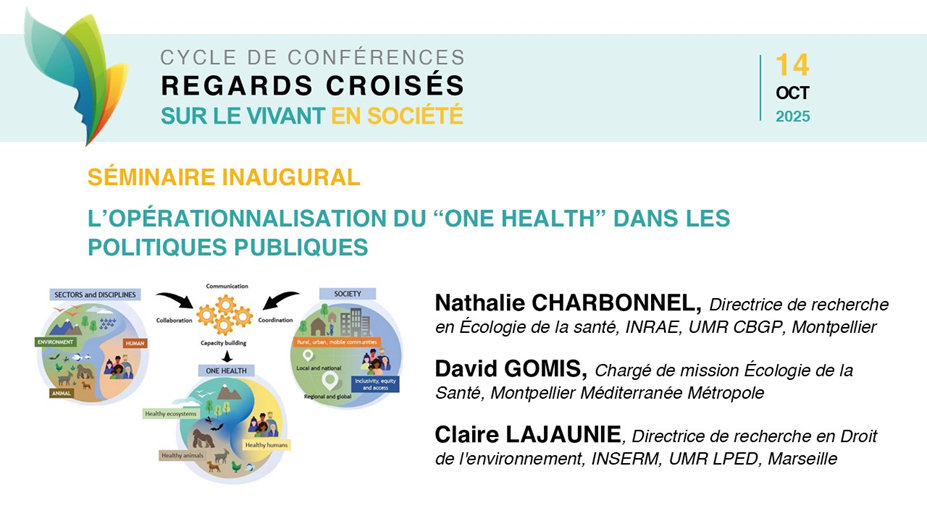The operationalization of “One Health” in public policy
This event has passed!
The Maisons des Sciences de l’Homme (MSH) in Montpellier (MSH SUD) and Toulouse (MSHS-T), the BiodivOc, RIVOC, and Octaave key challenges, the University of Montpellier (Pôle AEB), Paul Valéry University (UPVM), and the doctoral school "Territoires, Temps, Société et Développement" (Territories, Time, Society, and Development) (ED 60) are pleased to invite you to the next conference in the series "Regards croisés sur le vivant en société" (Cross-perspectives on living beings in society). (ED 60) are pleased to invite you to the next conference in the series Perspectives on Life in Society.
Everysecond Tuesday of the month between October 2025 and May 2026.

The COVID-19 pandemic has strongly highlighted the urgent need to consider the links between animal health, human health, and environmental health in a holistic manner. This led to the adoption in 2021 of an international definition of One Health in order to promote synergies between decision-making sectors and scientific disciplines, with a view to making this approach fully operational.
By bringing together research in health ecology, public policy, and environmental law, Nathalie CHARBONNEL (INRAe, CBGP, Montpellier), David GOMIS (Montpellier Méditerranée Métropole), and Claire LAJAUNIE (INSERM, LPED, Marseille) will discuss One Health governance and its implications for the environment and ecology through examples of operationalization at the local level.
This series of lectures brings together specialists from the humanities and social sciences on the one hand, and ecology (in the broad sense) and the environment on the other, to discuss major environmental issues with a view to broadening perceptions towards an interdisciplinary approach.
Eight doctoral schools in Occitanie (ED58, ED60, and Gaïa in Montpellier; SEVAB and SDU2E in Toulouse; ED305 and ED544 in Perpignan; and ED Risques et société in Nîmes) offer the program to their doctoral students as part of their training (registration required via ADUM).
The primary objective is therefore "acculturation," particularly for young researchers (although the seminars will be open to the entire scientific community), and to show how the same subject can be studied in very different ways by different sciences. In the longer term, the goal is to encourage aspiring researchers to integrate interdisciplinary approaches into their everyday work.
The series, offered in a hybrid format, is broadcast live from the Maison des sciences de l’Homme.
Receive a weekly summary of the UM agenda
* By entering your email address, you agree to receive a weekly summary of the UM calendar by email and acknowledge that you have read ourprivacy policy. You can unsubscribe at any time using the unsubscribe linkor by contacting us by email.
